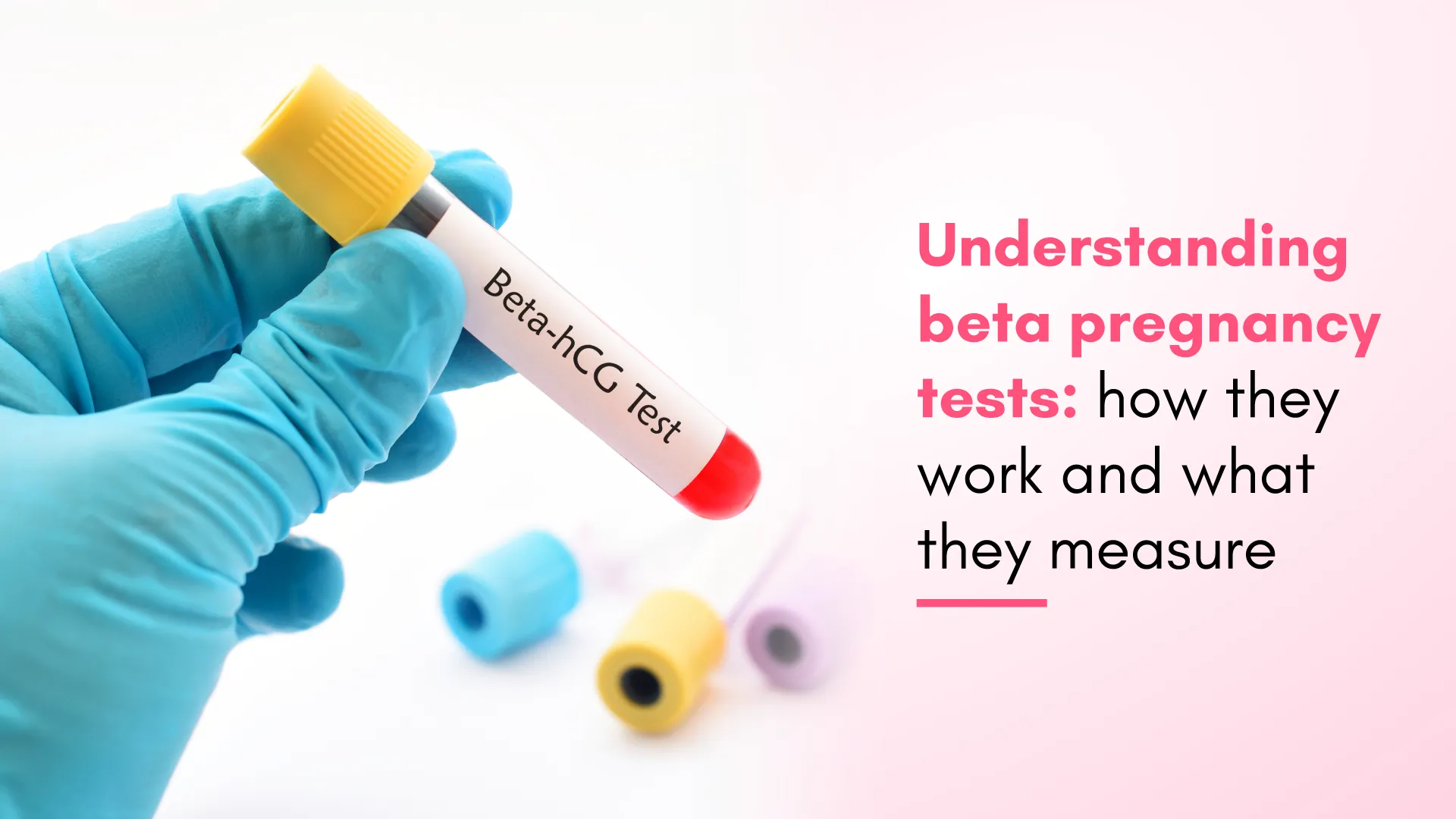The anticipation and questions surrounding the initial stages of conceiving make pregnancy testing pivotal. While traditional pregnancy tests provide basic confirmation, beta hCG pregnancy tests offer a deeper understanding by measuring the precise level of beta sub-unit of Human Chorionic Gonadotropin (HCG) in the blood.
Unlike traditional techniques, beta HCG pregnancy test measure the hormone produced by the developing placenta. The insights help healthcare professionals detect pregnancy and provide personalized treatment to women by addressing related concerns.
Also Read: How Soon Can a Pregnancy Test Be Taken After Implantation?
What is Beta hCG Test?
Beta-human chorionic gonadotropin (beta hCG) is a blood test that measures the levels of hCG hormones in the blood. It provides quantitative data on the exact concentration of HCG hormones in the blood. Further, a person’s bHCG level quickly rises during the initial weeks of pregnancy. A beta hCG test is impactful as it measures how effectively the placenta develops and produces the HCG hormones. The test has no side effects on pregnant women.
Also Read: How Long after Implantation Bleeding can I Test?
How Do Beta hCG Test Work?
There are two major ways of conducting bHCG test: qualitative and quantitative.
In qualitative HCG test, a person needs to check the elevated levels of HCG hormone in the blood or urine.
- A blood test detects the presence of the hormone called human chorionic gonadotropin in the blood to determine if a person is pregnant, providing a simple “yes” or “no” result. For that, a blood sample is taken, and the presence of elevated hCG hormones also indicates pregnancy.
- For urine test, patients provide a urine sample, and if the results show elevated hCG hormones, it means the patient is pregnant; if not, the patient is not pregnant. The ideal time to test for pregnancy at home is after missing your period. However, if the results are not satisfactory, healthcare experts recommend that patients undergo this beta pregnancy test again.
The quantitative beta hCG test measures the patient’s HCG hormone in the blood in international units per liter. Further, by examining the reports, the beta HCG level depicts the age of the fetus.
Suggested Read: Vaginal Swelling in Pregnancy: Tips and Remedies
When and Why is the beta hCG Pregnancy Test Used?…
Beta hCG pregnancy tests are best conducted 2 weeks after ovulation, following a missed period. This timing allows for sufficient HCG levels to accumulate post-implantation, ensuring accurate detection. These tests serve multiple purposes, including confirming pregnancy, assessing pregnancy health, identifying the risk of miscarriage, detecting ectopic pregnancy through USG (Ultrasound), and determining fetal age.
It is advisable for patients not to undergo the HCG beta pregnancy test too early since it would be challenging to detect the HCG hormone. Additionally, the human chorionic gonadotropin blood tests showcase results approximately after 10 days of conception; on the other hand, the urine tests may take a bit longer to show positive results.
Also read: First Pregnancy Scan after IVF Treatment
Interpreting Beta hCG Pregnancy Test Results
To find the answer to questions like “What is HCG level?” or “How can HCG levels be increased in early pregnancy?” It is important to know about the beta hCG pregnancy test if you’re expecting pregnancy. It is also important for non-medical individuals to understand how to interpret bHCG pregnancy test results. Therefore, let’s understand lower beta and higher beta HCG levels.
Interpretation of the Test Results
- A baseline beta-human chorionic gonadotropin (HCG) of less than 5 mIU/mL and taken approximately 2 weeks from conception is often considered negative for pregnancy.
- Similarly, a baseline beta-human chorionic gonadotropin (HCG) of greater than 25mIU/mL and taken approximately 2 weeks from conception is often considered positive for the pregnancy.
- An HCG level between 6 and 24 mIU/mL is considered a gray area, which healthcare professionals recommend reconsidering and retesting to check if the b HCC level rises to confirm the pregnancy.
- A baseline beta HCR reports positive when the HCG level exceeds 100 mIU/mL. High beta HCG also indicates twins or triplets, later confirmed through ultrasound.
Beta HCG Pregnancy Tests in Assisted Reproductive Technology (ART)
Assisted Reproductive Technology (ART) involves various procedures to treat infertility. One common test in ART is the beta-human chorionic gonadotropin (beta hCG) blood test. Around two weeks after embryo transfer during in vitro fertilization (IVF), this test determines whether pregnancy has occurred. Additionally, Preimplantation Genetic Testing (PGT) screens embryos for genetic abnormalities before implantation, aiding in identifying viable embryos and reducing the risk of certain disorders.
Factors Affecting Beta Test Results
Some of the major factors that impact the beta pregnancy test results are-
- Timing of Implantation- If the test is conducted too early, the HCG level might not be detected.
- Medical Conditions- Recent miscarriages, tumors or ovarian cysts, and Ectopic pregnancy impact the bHCG pregnancy test results adversely.
- Fertility Treatments- HCG injections can trigger ovulation and affect the results of the test.
- Multiple Pregnancies- Twins or triplets also lead to higher than usual HCG levels.
Other affecting factors are-
- Drinking too much water than usual.
- Getting a little urine quantity on the test strip.
- Using an expired or reused test.
- Side effects of current medications.
- Duration of pregnancy.
Advantages and Limitations of Beta Pregnancy Tests
Advantages of the bHCG test-
- It can detect pregnancy earlier than other tests, sometimes a week after ovulation.
- Assists healthcare experts to monitor pregnancy progress effectively.
- beta hCG levels can be monitored periodically in high-risk pregnancies to assess the risk of complications or miscarriage.
Limitations of the beta HCG level test-
- Variability in Sensitivity: Differences among brands/models can lead to confusion or false negatives.
- Timing of Testing: Testing too early can result in false negatives.
- Non-Diagnostic Nature: Elevated levels indicate pregnancy but can also result from conditions like ectopic pregnancy.
- Previous medical conditions influence the results of the bHCG pregnancy test, leading to reduced. accuracy.
Conclusion
If you’re preparing for a beta pregnancy test, it’s highly recommended to consult with the medical professionals and experts at Ferty9 Fertility Center. Known for its personalized approach, Ferty9 has been a trusted partner for many couples navigating through infertility and other pregnancy-related medical conditions. Their expertise and guidance can provide you with the necessary support and understanding during this important phase of your life.




























